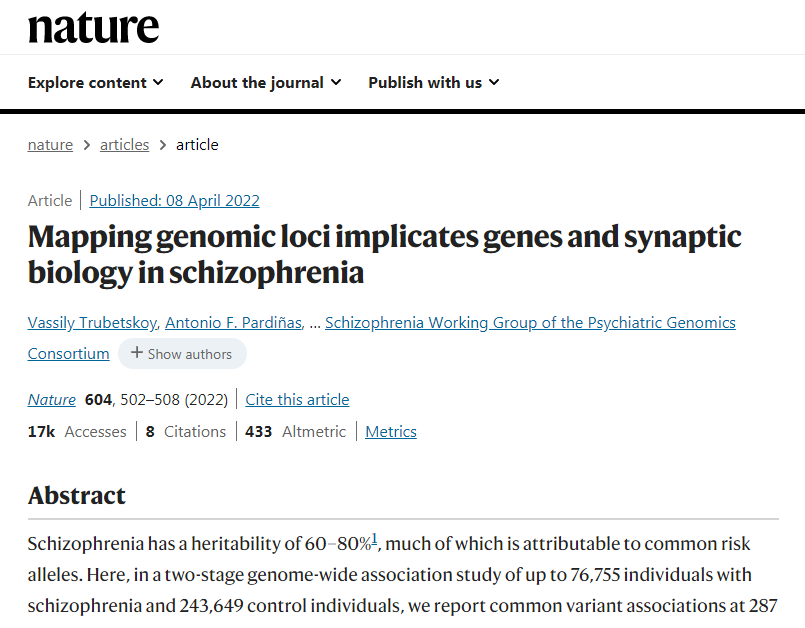On April 8, 2022, Psychiatric Genomics Consortium (PGC), Broad Institute, the team led by Professor Zhu Feng and Ma Xiancang from the First Affiliated Hospital of Xi 'an Jiaotong University (XJTU) and multiple prestigious research institutes at home and abroad joined hands to complete the largest schizophrenia genomic research. Relevant findings were published in an Article entitled "Mapping genomic loci implicates genes and synaptic biology in schizophrenia" in Nature.

Schizophrenia is a severe and complex mental illness. Much of the between-individual variation in risk is genetic, and involves a large number of common alleles, rare copy number variants and rare coding variants. A previous genome-wide association study (GWAS) reported 176 genomic loci containing common alleles associated with schizophrenia, but the causal variants that drive these associations and the biological consequences of these variants are largely unknown. To increase our understanding of the contribution of common variants to schizophrenia, the genome of nearly 80,000 individuals with schizophrenia and 240,000 control individuals was sequenced, and common variant associations were identified at 287 distinct genomic loci. Using fine-mapping and functional genomic data, 120 genes (106 protein-coding) were identified to be expressed in brain neurons (including excitatory and inhibitory neurons), which are mainly involved with fundamental processes related to neuronal function, including synaptic organization, differentiation and transmission. In addition, rare disruptive coding variants including glutamate receptor subunit GRIN2A and transcription factor SP4, and genetic mutations involved in other neurological abnormalities were found to be associated with schizophrenia.
PGC is an international cooperative organization to promote the genetic structure research of psychiatry. Stanley Center for Psychiatric Research at Broad Institute of MIT and Harvard is the world's top research organization for genomic research of mental illness, which is also the core force to promote the establishment of PGC and carry out genomic research for mental illness all over the world. In 2017, the team led by Professor Zhu Feng and Professor Ma Xiancang joined PGC, and established intimate cooperation with Stanley Center. Bilateral sides paid mutual visits for multiple times. Professor Zhu Feng studied at Broad Institute from 2018 to 2020 as a visiting scholar. This study is the second article published by multiple institutions. At present, bilateral sides are continuing to conduct intimate and in-depth cooperative research on schizophrenia.
Article link:https://www.nature.com/articles/s41586-022-04434-5